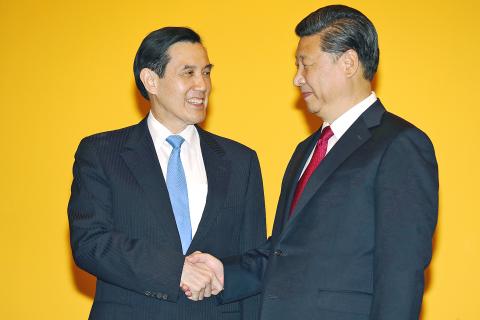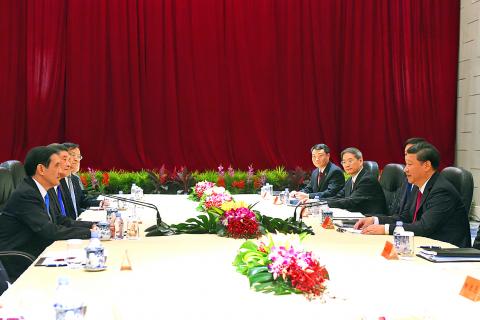President Ma Ying-jeou (馬英九) and Chinese President Xi Jinping (習近平) held a historic meeting in Singapore yesterday, the first time the leaders from both sides of the Taiwan Strait have met since 1949 after the Chinese Nationalist Party (KMT) was defeated by the Chinese Communist Party in the Chinese Civil War.
The summit, which began with the two exchanging an extended handshake before going behind closed doors, was trumpeted by Ma and Xi as a milestone in cross-strait relations.
“Today is a special day where leaders from two sides of the Strait meet,” said Xi, who was on a state visit to Singapore to celebrate the 25th anniversary of diplomatic ties between China and the Southeast Asian city-state.

Photo: AP
“Both sides of the Strait are brothers, a family of blood that is thicker than water,” Xi said in his opening remarks of the meeting at the Shangri-La Hotel.
Xi said: “We should let the world know with actions that Chinese on the two sides of the Strait are completely capable of solving our own problem with wisdom,” adding that both sides of the Strait have since 2008 moved toward a path of peaceful development and that people of the two sides have made great efforts to keep the cross-strait situation stable and harmonic over the past seven years.
“I hope that compatriots on both sides of the Strait can jointly uphold the [so-called] ‘1992 consensus,’ consolidate common political foundations, maintain the correct cross-strait development direction and jointly seek great invigoration of the Zhonghua minzu [Chinese ethnic group, 中華民族],” Xi added.

Photo: Taipei Times
The “1992 consensus” refers to a supposed understanding reached during cross-strait talks in 1992 that both Taiwan and China acknowledge that there is “one China,” with each side having its own interpretation of what that means. Former Mainland Affairs Council chairman Su Chi (蘇起) in 2000 admitted that he had made up the term “1992 consensus.”
Ma said that Taiwan would continue to consolidate the “1992 consensus,” maintaining the peaceful “status quo.”
He also called for lowering the state of hostility across the Strait and expanding cross-strait exchanges.
Ma said the “1992 consensus” was subject to the “one China” principle, neglecting to mention the “different interpretations” component that the KMT administration typically stresses.
During the meeting, Ma and Xi addressed each other as “mister,” rather than “president.”
While no agreements were signed and no joint statements were issued following the summit, China’s Taiwan Affairs Office Minister Zhang Zhijun (張志軍) told a post-meeting press conference that both Ma and Xi believe the “1992 consensus” should be upheld, as it “has great significance in promoting the long-term development of cross-strait relations.”
China and Taiwan both belong to “one China,” and dealings between the two sides are not “country-to-country” relations, nor a matter of “one China, one Taiwan,” Zhang cited Xi as saying.
Zhang said China welcomes Taiwan’s participation in the China-initiated Asian Infrastructure Investment Bank and its “One Belt, One Road” policy, adding that China is willing to consider and discuss the issue of Taiwan’s international space as long as Taiwan’s participation in regional economic integration and international activities “does not create the perception of ‘one China, one Taiwan,’ or ‘two Chinas.’”
Zhang quoted Xi as saying that “the forces seeking Taiwanese independence are the most real threat to cross-strait peace.”
Zhang said Xi agreed with Ma’s proposal to set up a cross-strait hotline, as it could help improve exchanges and dialogue.
Ma later told a separate press conference that he found Xi “pragmatic, flexible and frank.”
Ma said he hopes such a spirit could be reflected in the future handling of cross-strait matters.
During the meeting, Ma raised the issue of Taiwanese concern over China’s military deployment against Taiwan, he said.
According to Ma, Xi said that “the deployments do not target Taiwan.”
With regard to the “1992 consensus,” in response to reporters’ questions over Taiwan insisting that “one China” means the Republic of China, while Beijing emphasizes its “one China” principle, but intentionally ignores the latter part of the “consensus,” Ma said each side is free to interpret what “one China” means.
“That’s why some have said that [the ‘1992 consensus’] is a masterpiece of ambiguity,” Ma said.
Ma, who attended the closed-door meeting in the company of six other officials, said he found the summit helpful and positive, and reiterated that the purpose of the meeting with Xi was to take a first step toward paving a foundation so that a mechanism of institutionalized meetings between leaders from both sides of the Taiwan Strait could be established
From there, it can allow for the possibility of “super stable” cross-strait relations, he said.
Ma departed Singapore for Taiwan at 9pm on a charter flight after a dinner with Xi.
Later last night, Singaporean Prime Minister Lee Hsien Loong (李顯龍) posted a picture on Facebook of him having tea with Ma, adding: “Glad his meeting here went well. Hope this will lead to greater stability and prosperity for the region.”
Additional reporting by CNA

MORE VISITORS: The Tourism Administration said that it is seeing positive prospects in its efforts to expand the tourism market in North America and Europe Taiwan has been ranked as the cheapest place in the world to travel to this year, based on a list recommended by NerdWallet. The San Francisco-based personal finance company said that Taiwan topped the list of 16 nations it chose for budget travelers because US tourists do not need visas and travelers can easily have a good meal for less than US$10. A bus ride in Taipei costs just under US$0.50, while subway rides start at US$0.60, the firm said, adding that public transportation in Taiwan is easy to navigate. The firm also called Taiwan a “food lover’s paradise,” citing inexpensive breakfast stalls

TRADE: A mandatory declaration of origin for manufactured goods bound for the US is to take effect on May 7 to block China from exploiting Taiwan’s trade channels All products manufactured in Taiwan and exported to the US must include a signed declaration of origin starting on May 7, the Bureau of Foreign Trade announced yesterday. US President Donald Trump on April 2 imposed a 32 percent tariff on imports from Taiwan, but one week later announced a 90-day pause on its implementation. However, a universal 10 percent tariff was immediately applied to most imports from around the world. On April 12, the Trump administration further exempted computers, smartphones and semiconductors from the new tariffs. In response, President William Lai’s (賴清德) administration has introduced a series of countermeasures to support affected

CROSS-STRAIT: The vast majority of Taiwanese support maintaining the ‘status quo,’ while concern is rising about Beijing’s influence operations More than eight out of 10 Taiwanese reject Beijing’s “one country, two systems” framework for cross-strait relations, according to a survey released by the Mainland Affairs Council (MAC) on Thursday. The MAC’s latest quarterly survey found that 84.4 percent of respondents opposed Beijing’s “one country, two systems” formula for handling cross-strait relations — a figure consistent with past polling. Over the past three years, opposition to the framework has remained high, ranging from a low of 83.6 percent in April 2023 to a peak of 89.6 percent in April last year. In the most recent poll, 82.5 percent also rejected China’s

PLUGGING HOLES: The amendments would bring the legislation in line with systems found in other countries such as Japan and the US, Legislator Chen Kuan-ting said Democratic Progressive Party (DPP) Legislator Chen Kuan-ting (陳冠廷) has proposed amending national security legislation amid a spate of espionage cases. Potential gaps in security vetting procedures for personnel with access to sensitive information prompted him to propose the amendments, which would introduce changes to Article 14 of the Classified National Security Information Protection Act (國家機密保護法), Chen said yesterday. The proposal, which aims to enhance interagency vetting procedures and reduce the risk of classified information leaks, would establish a comprehensive security clearance system in Taiwan, he said. The amendment would require character and loyalty checks for civil servants and intelligence personnel prior to